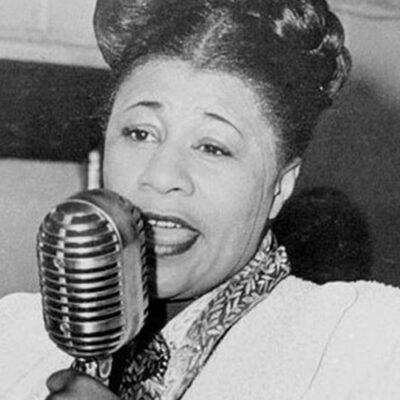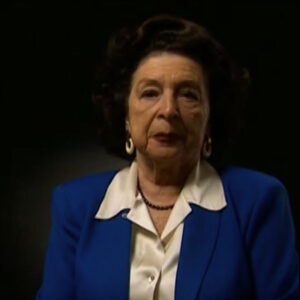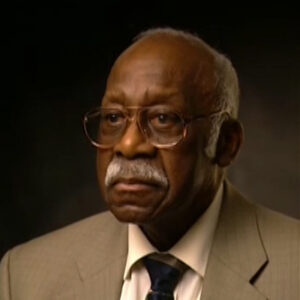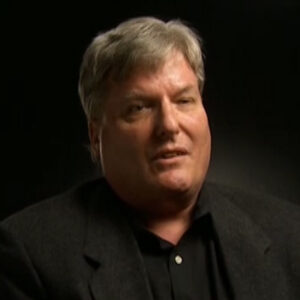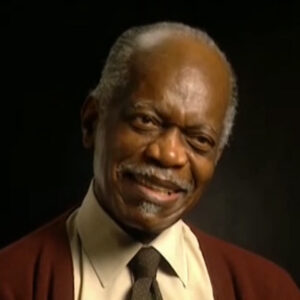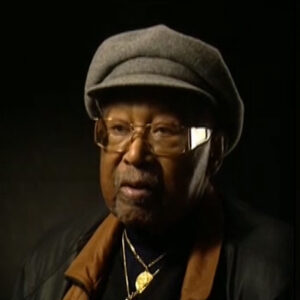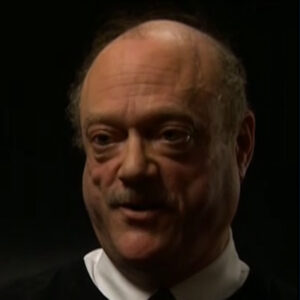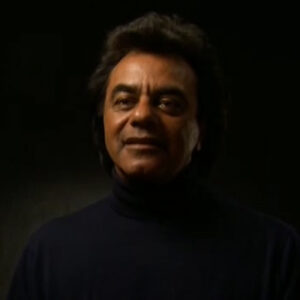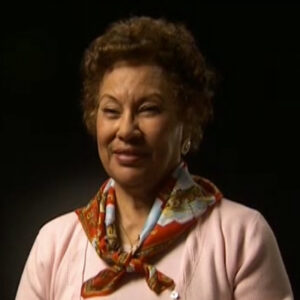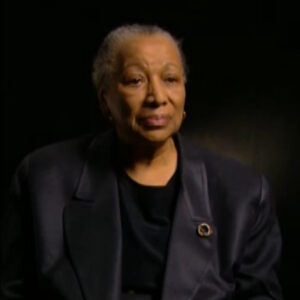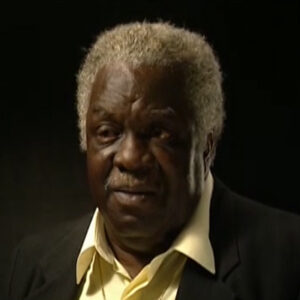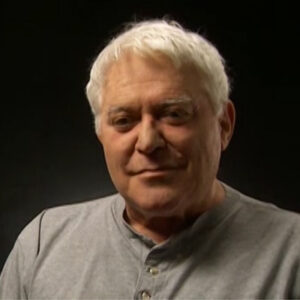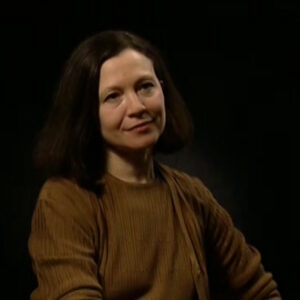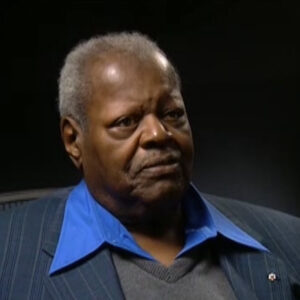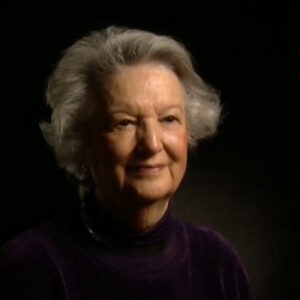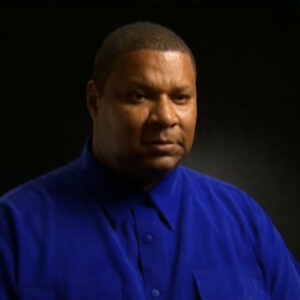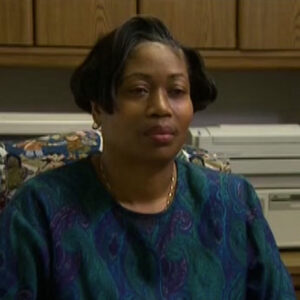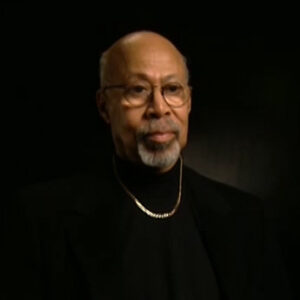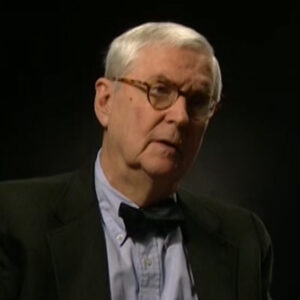Speaker If you don’t mind, I can sort of just make a guest with the head, with the ham, you know. OK. Because you like you see she’s thinking intellectualising, you know. OK.
Speaker The first thing I do is to give me a kind of a. What Harlem was like in the 30s, when that was what Ella would have walked into in terms of the entertainment.
Speaker Well, Harlem in the 30s was actually called the entertainment capital of the world because everywhere in Harlem ate lunch at some place, there would be some form of entertainment. There was clubs, there were clubs that was down in the basement. There were clubs. We had the Cotton Club. We had the. We had Connies in. We had the Lafayette Theater. We had the Apollo Theater. And most of all, we had the most magnetic place in Harlem, which was the Savoy, which attracted people from all over the world. Now, the amazing thing about those days, you see, you didn’t have air conditioning. So these places had these big wide windows all along the avenue and they were open completely because so that air could flow through to those places because it got ordinarily hot and which counted when the bands got up on those bandstand and played music. Well, naturally, the music emanated out of the ballroom into the street so you could always hear music on the streets of Harlem. There was the Cotton Club, which was two blocks up, which housed the great Duke Ellington, the great production shows. Now you can stand on the street and hear Duke Ellington’s music. Well, now you in the generation that’s growing up amongst this festivity type of atmosphere and being young, you’d you respond naturally to whatever is playing. And that happened to be that music that was coming in was called Swing. And that’s what Ella came into. She came in and she was part of that young, young generation. Was the atmosphere that Ella came into now? In those days, every theater had some kind of amateur contest. The Lafayette had an amateur contest. There was a theater called Odean had an amateur contest. And the Apollo had a, oh, amateur contest that became very well known because this M.C. was named Ralph Cooper and he was a very popular figure around Harlem. So this amateur night, which last even till today, was the most prominent in Harlem. So naturally, everybody would want to go to compete at the Apollo Theater. One day there was a girl there that competed with those contestants. She happened to win the contest. But originally, she walked on stage to be a dancer. And from what I understand, she got stage struck. She got just frightened. And somebody told it was saying.
Speaker And she did, and she won.
Speaker And by winning, you get a week’s work, which is always a prize for any contestant winner in those days. You get a week’s work at the theater. She happened to be booked at a theater up the street called the Olive Opera House. Now, this day, we’re all kids in school. We’re in high school. And we hear that Louis Armstrong is coming to the Apollo Theater. So Friday, everybody plays hooky. Hold school. To come to her because we didn’t get Louis Armstrong that often and a few times he would come, we would want to see him. But when we got to the theater, he was canceled because of his lip. Something had happened to us. Now we’re out of school. We can’t go home. So there’s a theater right up the street called the Harlem Opera House, and the whole school goes up there to see the show. Tiny Brad shows the band, which is a very popular band with young people. And they made the announcement that there was a girl who had won the contest and she was going to be. And we’d like to present Ella Fitzgerald. So when she walked on stage, we started booing Boo Boo.
Speaker Get out. Give me that dollar. And she got to the microphone and she started when his eyes say yes and you’re wrong. I guess that’s Judy by this. So she wrote that she quieted us down. We had heard a voice that we know it was the music that we were listening to. You know, see, when you’re a kid, you listen to a kind of music. And we heard our singer, she became a singer. From that day on, when she got finished, believe me, you could hear Rhett P.P. on Cotton. Sensational.
Speaker What was it in her voice? It was so sweet.
Speaker She was a natural swing. She could naturally swing. She was the queen of swing. Every singer who came after Ella. Adopted what she has standard. And her standard was the highest everything. Sarah Vaughan, Carmen McRae, Della Reese, every great singer who came along behind Ella Fitzgerald. They all got something from Ella Fitzgerald. Up until she died. I mean, never everyone. Chris Connersville. Anita. All day. Everyone. They all pattern up form of Ella. They all had their different outlet on how they they they portrayed a song. But no singer didn’t come along. That didn’t take something from Ella Fitzgerald. Everyone when she sang with the band, we danced to her. We danced to her music. I mean, you know, how you up on a bandstand. And she sang so we could dance.
Speaker And she would hit her leg like this. And it was just the camaraderie between her because she’s a dance with us. Remember, she’s 16 and 17 years old. She could dance as good as anyone. And before she died, she sent a message to me through my friend Phoebe Jacobs in New York said that, don’t know, I can still swing out, which she could, you know, of course, you’d have the toes and everything amputated.
Speaker But Ella was a strong force in the world of music. Everyone everyone listened to her.
Speaker What happened after she went while she went on to be in a band single, which was someone suggested because Pardoo Ally, which was a band leader with Chick Webb’s band, wanted Chick Webb to listen to Allen because he’d already had everybody all bands had male singers. They always had male singers. He wanted to he the force. Chick Webb to listen to this girl. But Chick Webb didn’t want a girl singer. He said, I got 16 men in my band. I’m not going to take a 16 year old girl with me on the road. And those days you had to stay on the road.
Speaker So what happened after he had heard us sing? And then he took us someplace to Princeton and said, if that if the Princeton guys liked her music, he would bring her to the Savoy Ballroom. Well, when he brought her to the Savoy Ballroom, what was a foregone conclusion? She finished that spot like a glove. She brought to the bandstand something that no one has ever done before. A girl just wailing. I mean, she had a way of singing that could just. I don’t know. She had everything. She had everything. We used to be her opening act. When the when the band would leave the Apollo in those days, the bands would play the Apollo or the Howard in Washington. The Royal in Baltimore. It’s the a round circle. So when a band would leave the ballroom, they’d have two weeks work. You’d get three more three more weeks work. Travelling now, when the band left, they would have like a package show that we happen to be package, along with Ella Fitzgerald, the Lindy Hoppers, why these need to help us became the opening that Ella Fitzgerald Chick Whips band. So that was the combination that traveled and she used to. She loved us being with us. We were all the same age. And after the show, you know, so you did four and five shows a day. You didn’t go anywhere.
Speaker Between shows, you sat in the dressing room, so you played cards. Ella loved to play cards. She loved to play hearts. And we would dash off the stage and we’d be sitting down waiting for her to finish her number so we could play hot.
Speaker And while she would be playing these hearts, she used to doo doo doo doo doo doo. You know, just hummin. That became Schatten. Now you’ve got people going to school learning how to skate. She started all of that.
Speaker My managed to borrow.
Speaker And he had the McKale agency, which put the bands into the Savoy. So when the package went at it, it went out as a Gaile agency package because all of it was packaged by mail, Gail, in those days it wasn’t called Monopoly, but it was a monopoly.
Speaker Well, not to us. We were dancers.
Speaker Yes, this was never paid. I believe we struggle along. But we were part of a very, very hot package because Chick Webb was just remember, Chick Webb was the king of Swing and he had the best girl singer in the country with him. And he had the swinging his dancers with him. So he had a swinging child.
Speaker And we were at the Paramount Theater in New York. And we had done the first show and we knew something had happened. The second show, Chigwell didn’t come back. And Kaiser Marshall replaced him. And that was then we knew that he had been sick for a long time and they took him to the Mayo Clinic. And, you know, he died about a month later. And then when we had gone into Paramount, it was Chick Webb Band with Ella Fitzgerald.
Speaker When we come out, it was Ella Fitzgerald with the Chick Webb’s band. She took over the band, the head of the band, and she did that for a while, I guess, until she started doing a single. But she was a wild yet before she did a single.
Speaker We have there’s a paper there’s a newspaper in the Baltimore paper, have it with her sing and my buddy at his funeral.
Speaker Oh. Devastated her. She was like he was her father.
Speaker He kind of thought through a great career. They did that great number together, Toscana Tasket. And, you know, that became that was the biggest hit he ever had.
Speaker And she wrote it. Well, she was always writing lyrics anyway, she’s very prolific.
Speaker She.
Speaker Of course, she was a black guy. Well, yes. You see, she was phenomenal. There was no black singer out. I mean, other than that, we had to Ethel Waters that we had the Bessie Smith and Hablas another kind. This was another music coming into America.
Speaker This girl represented that music that was not too many places where it was opening up. Even Count basically couldn’t get into a hotel. Back in those days. But Benny Goodman heard Benny Goodman wanted her and Benny Goodman presented her on. I think it was the camel. The camel airs something on radio, which was a very big thing in those days, and he presented her on radio that began to open doors for her. But there was no employment. Billie Holiday couldn’t get a job. These singers couldn’t even get a record. It was a long time.
Speaker Do they have anything to do with her appearance?
Speaker Well, appearance would have had a lot to do with the fact that they wanted somebody extraordinary, glamorous, where a woman was concerned. And that was wild. That was Ellen’s shortcomings. But she had to get past that because, no, her parents, she wasn’t happy. She didn’t look like a goddess. She sang like one. But they had to do a lot of grooming eventually to make it so that she began to be the dowager appearance that she eventually began. But it was difficult because it always seemed to be they had the wrong dress on.
Speaker She says, I got to get that dress.
Speaker But you overlooked everything once she started singing. But there was a lot of places that Ella Fitzgerald just couldn’t play. But there was a lot of places. Why do you hope it couldn’t play? You know, it was that White X began taking us on a jobs. That was how we got to more employment. But there was a barrier.
Speaker There was a barrier, and believe me, you couldn’t get into radio. Now for saying couldn’t get into radio, you couldn’t be heard by that was wow, that was weird.
Speaker That was the extension. But she eventually got into radio. She was too good not to be recognized. She was just too good. Then eventually, Norman Grants began. Manager Guy.
Speaker He was the one that started the jazz at the Philharmonic. Norman Grahams that became her personal manager. And he didn’t book nobody else. But Ella.
Speaker I told you we buton because that’s why we put it the way she looked. But it’s true, you know, she’s an amateur.
Speaker She’s a kid coming out it over a frumpy dress, you know, not too chic a hairdo, but I’ll be the hood. No. But here, too, is that though none of us really was chic. We were kids upstairs and all the way up in the third balcony. Saddle shoes and stuff. We were a rowdy bunch. But she represent what we were mean. We didn’t look no better than she really. But she was not the most meticulous person that you would want to see on the stage. You know who who had the charm in those days was Billie Holiday.
Speaker I mean, Billie Holiday always had a fabulous appearance because she had a great looking face. You know, she had a handsome face. And Ella just didn’t. But Ella just overcome the whole of that, which is the way she could sing.
Speaker Mm hmm.
Speaker Yeah. John Hammond, the Benny Carter, called John Hammond when he because she won the contest with Benny Carter’s band at the Apollo. And Benny Carter got on the phone and call. John Hammond said, I want you to hear Girl sing because John Hammond was a devotee of swing. I mean, he was the one that put Benny Goodman band together and made Benny Goodman put black musicians with his band because he always said that unless you have some black musicians, white musician and white music can’t go anywhere.
Speaker And black music can’t go nowhere, they must join. And he was he believed in that. And that’s why I loved him so much, because he was sincere.
Speaker He felt that black entertainment and white must co-exist. And in the music has had to. So that was why Benny Goodman had Lionel Hampton, Fletcher Henderson, because they were playing all of Fletcher Henderson charts anyway. But that’s when he had that group in his band that became that Master Charlie Christian. And so so that when he had to go into a hotel.
Speaker He can just take the black musicians out and, you know, he he didn’t want to jeopardize his status by putting black musicians in hotels you didn’t have it in. But the group was so good it disband the band and kept and kept. The small group does what we did swinging the dream in New York City. Benny Goodman had the small group.
Speaker That was the band he brought into that that show that we did in a city center swing in the dream that it was going to her to.
Speaker You took it to the to hit the house so they could because Fletcher Henderson had a good piano and John May never won and ended by playing piano. It was a good piano. So they brought Ella to John Hammond to a Henderson’s house so that Fletcher Henderson could play the piano. Ella to sing.
Speaker And he hurt Ella sing. And that’s what he predicted, that she was going to be a big star.
Speaker But at the moment he just couldn’t do nothing for her because he couldn’t even get Billie Holiday a record contract. And that was how she got over to mom. They took a rover to Mom Gale with a similar bar.
Speaker Just tell me the story of how they actually got to.
Speaker Well, he went to pick her up in his, you know, station house in 1935.
Speaker The rooster with the with the rumble seat. And he went to pick Eleanor up. And John said that when he drove up him and he was going to let Ellis sit in the front seat with John and he’d sit in the backseat with Georgie and said that when Ella saw that John Hammond was white, she wouldn’t sit.
Speaker She would sit next to. So she got the rumble seat. So John said he was driving to Fred to Henderson House with Ella Fitzgerald sitting in the front seat. He told me this when I interviewed him in 1982 for my book. And he said it was the funniest thing. But see, he was a lover of great music. And if a person could, QWhy, he went anywhere to hear a swing band.
Speaker He went all the way out and brought Count Basie into the Savoy Ballroom. He loved great swing music. And he was the one that initiated the Battle of the Bands. 1938 between Chick Webb and Benny Goodman. And who was gonna be the king of Swing. Of course, that argument persists still today. I said Chick Webb. John Hammond says Benny Goodman. So they say we are both prejudice.
Speaker Fairmont. Yeah, we would I would Bob Hope movie him and Martha Raye. That movie that they made, that was a bomb with Paramount. With that movie.
Speaker Have you played cards backstage?
Speaker Oh, yeah, always. Did you tell? She scattered, she do searches just, you know, be talking about that day that, you know, that they it just just. Mouthing sounds. Nothing that later became what was known as Scaddan, which today everyone tried to emulate. This lady, if you hear anybody, Schatten, they are trying to do Ella and they listen to her records over and over and over again. And it’s a way of saying now you can go and take classes to learn how to skate.
Speaker Can you imagine that? That’s what they do in the jazz world.
Speaker Now they’re doing the.
Speaker Well, I didn’t hear much about her family because what I understand, she was an orphan.
Speaker Chick Webb adopted her.
Speaker And, you know, I assume because by him adopting a we used to hear stories that she didn’t have any print, but she was staying up in Yonkers at the time. So I don’t know who her parents was. But from what I know, she cub she was adopted by Chick Webb and her career began with him as her guardian.
Speaker From the time she was 16. So, OK, you made.
Speaker Oh, yes. She recorded that while she was at the Savoy. That was a big hit. As a matter of fact, I don’t think Chick had a bigger hit than just going to Tasket. And that was a combination of both of them. And that was I mean, of course, like your soared to the top immediately because she did it in the movie. It wasn’t we looking at that movie. She just did it. That was the movie. She was. Abbott and Costello. So that was a times when she started getting movie parts, you know, and but coming up during the same period, you see, you had Lena Horne.
Speaker And Lena Horne had this illusion of the most beautiful black woman there is and blah, blah, blah. So now whatever comes along, it’s going to be compared to Lena Horne.
Speaker But then not too many women could be compared to Lena Horne. But Lena Horne wish she could have Ella’s voice.
Speaker That was a different. But they respected each other in spite of the fact that everybody know that Lena couldn’t bring Ella shoes. No way. No way. I mean, Ella, Lena was everything you would want to see an illusion. She’s visionary. But when you want to s to come into that ear, you want Ella.
Speaker And the best proof, she says she was able to sing Cole Porter. She can do Gershwin. She was not no limit. There was nothing she can sing. I mean, you can just go back on her albums. She covered everybody. And nobody ever thought she would venture out. You remember, that’s the first time a black singer ventured out into midstream. Recordings like Dinah Shore. I mean, she was in. She was unreal. She was unreal. She was everything. She was everything a good singer was. And everything came from her ear.
Speaker She never had a lesson in her life on anything. She heard that music the way that music was, and that was an innate thing that she had because no one could have done what she did not. Not in all the years that she was singing at you. Never tired of the voice. You could always listen to Ella.
Speaker What do you think we gained from Chick with?
Speaker Oh, a sense of rhythm. Oh, I can you imagine having your own drummer?
Speaker I mean, I travel with my drummer for years because, I mean, I wanted a certain rhythm. And even Sammy Davis Jr., who stole my drummer because I had said that good a drummer. But she got Chick Webb. He could read go. How did your arrangements was. And that and he had a personnel that you can believe it. I mean, there was a guy called Taffe Jordan of a berry to Berry. She had the greatest musicians in that band because remember, all the great musicians was in one band.
Speaker I mean, they. It was later on they started drifting out to where they could join white bands. But prior to that, every black band had sensational musicians because remember, they had no other place to go. So anytime he was in front of a great band, you would it was a great band. Why coastal the musicians there would have been the best. So what happened when they started breaking all that down? When John Hammond insist on bringing black musicians, then you’ve got guys like Hartnett’s page going to Artie Shaw. You’ve got guys gone. You’ve got Charlie Shavers going over him, leaving. The black bands, which is always the case whenever integration comes. Black businesses suffer because not it can spread out and they want to join whatever, quote unquote, the white businesses. So they know that’s where the money is and that’s where to go. But in those days, you had a context of greatness and a girl who sat in front of them that drove every musician because they knew they heard something they have never heard before. They heard a voice. She wants to swing what she was a Rembrandt painting. I mean, she was the only one now, not on the other side, parallel with that, Korea is Billie Holiday. The two Koreas parallel the great singers, great stylists, but each one went in a different direction. Billy was slow with language and lyrics, and all her music was always just at the same level. Like you’ve never heard Billy go high. I go low. It was always like this. And every song, every musician played the same way with Billie Holiday. And here’s another girl has taken what they call a swing and beat. And she became the goddess of swimming. There was nobody because when Michael.
Speaker Like a system, cause they might have been some kind of a you know, the law was no fraternizing. I don’t know how much that was true, but she would not allow her to. You couldn’t date anybody in the band. That was against the rules. But none of us could. We couldn’t date guys in a band and nothing like that. It was against the rules.
Speaker You know, it’s a funny thing, you know, in those things, we had a very strict discipline code.
Speaker I mean, they tried to keep it down as much as possible, but they frowned on fraternizing in any kind of way. So she never got involved. To my knowledge. With any members of the band, she did so later. But at those teenage years, no doubt that we were held very strict in our teenage years.
Speaker Well, I imagine she did. How could you have a boyfriend?
Speaker I mean, you two who travel it every six, seven days to four shows a day. You start at twelve o’clock in the day.
Speaker You’ll finish ground talk at one o’clock in the morning. You could get what can you do? And, you know, this night you don’t have all night places unless it was after our bars. Well, we were at the ages. We couldn’t go into bars. We couldn’t go anywhere but home. So we all sort of just hang together, you know, in the hotel or everything else goes. That’s all we had was each other and say we were her age, we were her peers. So she was. They thought she was she was safe with us, you know, and we’ve never had any problems. But later on, everybody branched out and all the problems began. And I think she got married a couple of times. She married a. A figure around town in New York at the time, if not a local fellow, it by name was Cigaret. And anyway, the agency was very furious about that. And then she had to get that they got an annulment. Forced her to get an annulment because he was a character. She but she wanted somebody to be nice to. But up first, marriage was a disaster.
Speaker You know, they got an old.
Speaker Your condition is very bad.
Speaker You couldn’t go to a restaurant, you couldn’t go in. And we we no place. I miss you. They gave a special permission. You couldn’t get. You couldn’t go to a back door to get a sandwich. Like what? We were traveling with at the waters and we had a bus to Lincoln Zephyrs, chauffeur driven cars. We pulled up to the White Tower in Ohio and we couldn’t get a hamburger.
Speaker I mean, we would not be we were in the no jeans and shagging. We re well covered up. He couldn’t get a hamper until this day. I can’t go to to toe mad with everybody, but does a little bit a hamburger. Thanks. Could you believe that.
Speaker But that’s was the conditions. I think that’s why Billie Holiday flipped. Because in those days she was traveling with a band only black woman on a bus. The guy’s got to stop at a restaurant. I didn’t get off and get a sandwich. She got to stay on the bus. So Artie Shaw used to what he used to say. I know she’s gonna go crazy because he noted Billy snaps like Ella didn’t. Ella was always pacifists. She was always very gentle, very sweet. And she never got into any kind of can’t couldn’t, you know, she never got into any kind of activism. She never took on causes.
Speaker She was a girl that just went on her weight just like that, where it as opposed to Billie Holiday with some Ayatullah. She couldn’t go on. She won’t take up a and it through that window. And that was the difference between the two of them. But conditions was just they were hard for a woman. I mean it was hard time because it’s bad enough with the guys. But hey, always said you got one woman on the bus. I mean, what are you gonna do? You got whenever you pull into a town, you gotta go to somebody’s house to get a room. You cook the hotels was not open to you. No, hotels were. I mean, and then you have to go in some place, say, do you serve colored?
Speaker That was the conditions.
Speaker Oh, yeah. He would know it was with the basically right.
Speaker Yeah.
Speaker So, you know, you’re running into all kinds and you just don’t know what you’re gonna run into. I mean, we just when we were travelling, I mean, there was you had to look for somebodies house to stay in.
Speaker Doesn’t matter where you lived, you know. So like when there were places always around near the theaters that always accommodated the black artists. And that’s what you had to live up to. And then you had to eat in those places. So that’s how come you eat a whole lot of fried chicken with rangers’? No. I know in those days, nothing was really dangerous. I mean, Lisa needs to avoid and walk all the way to the subway. We used to Big Joe. It used to be on the door with all kinds of diamonds. He never got stuck up.
Speaker Nobody ever thought about doing any harm to anybody. I mean, everybody was glad to be here.
Speaker So we didn’t have the criminal element that began taking over. The criminal element took over. This was way after the wars. But in those days, no, nothing was dangerous. It just wasn’t. We just didn’t have a lot of accommodations. They didn’t bother us and we didn’t bother them. When we’d come to a town to do a show, we’d go where we know we could go and we eat, where we know we could eat. Florida was the same way we were down there with Joe Louis. And I remember them saying to Joe Louis, you know, Joe Louis, I’d like to play golf and the Step Brothers. In all those days, we all had to stay at one hotel, the the Mary Elizabeth Hotel on Second Avenue, Thurgood Marshall, Jackie Robinson, Roy Campanella.
Speaker Think we all had to stay the same place because the Dodgers farm team was in Florida, Miami.
Speaker But the white players stayed on the beach. Not a black player stayed on Second Avenue. Larry Dopy. That’s how I met all these guys. So we all there in the same kind of atmosphere. Well, Joe was come down there because when he retired, the world’s heavyweight championship, retired at the very least with hotel. And we were all sitting there beside him because now this is the biggest athlete in the world. He’s the champion. Right. So they asked Joe what what they could be what they are. We playing golf. So, you know, Joe could go to the golf course every day because the world looked and he turned to wanted to separate and say what day? We played golf. So they say, well, well, they allow us to go on Wednesday. You see, then I blue Wednesday. He was that kind of a person. But that was the situation. And it happened to Joe. Joe Lawless.
Speaker Yes. Well, I didn’t know him personally. I mean, he’d have a book does. But I did Newport Jazz Festival that he his jazz festival in Newport. Went with the basic band. And that that was the. By that time, you know, listen, when he got to the Newport Jazz Festival, you couldn’t get his phone number, you know, but I didn’t know him personally. But I’ve been in his presence a few times. But I knew John Hammond very well. We we were young people together in the ballroom and we saw each other every day. We weren’t in the same league. He was with the bands I was over here with. But we saw each other coming up the stairs or going out the ballroom. And we began to know each other very well. And when I went to write my book, he was one of my first interviews because of one of the people who was with me back in the days of the Savoy.
Speaker Look at your. OK, OK.
Speaker I didn’t stay in touch. I every time she appeared somewhere, I if I was near, I would go to see her. But the last time I saw was when she went to.
Speaker She came to Radio City. And she had Jopek with her. And I had. She gave me tickets to see the show. And when I left, she gave me the basket that she always got. And it had champagne and two glasses. So I still got Ella Fitzgerald champagne glasses in my closet. And that’s the last I saw her. Radio City. She by that time, she had been the diabetes had been overtaken her and she started getting weak. You didn’t speak to her? No. I got a message from her from Phoebe Jacobs. And she said that because Phoebe was. Took care of Ella. She was woman had Ella. She got Duke Ellington. She she isn’t, as you know, Louis Armstrong Foundation. And she had Eubie Blake.
Speaker And she had Phoebe. Phoebe is New York.
Speaker Anyway, she was the one sent the messages that Ella said that she could still tell. No. I could still swing out.
Speaker But that was just a gesture. It was just sweet.
Speaker Wasn’t it a Brunswick?
Speaker It had to be an old Brunswick, I think, because that was a record label in those days. You know, see, I didn’t make records. I did. I mean, and I guess those days to get a record out, that was Victrola days, you know. Really. But just got a task. It was. I don’t know whether Litsa was on the back of it because I think it was an instrumental that Chick Webb had. It was on the back of that because Litsa was his big hit, too. And I think just got a task of was only up because I think that’s the first time they introduce Ellen, if I’m not mistaken. But you can find that out with the with her albums because, gosh, she must have had a million.
Speaker You swung to skin test. I mean, it does simple.
Speaker That’s exactly what swing is simple. I mean, it kills has not a nothing clouding to be. And can she take what she did, a lot of little lyrics, things like that. You know, she was a good lyric writer.
Speaker I think she did something on. On a ring illegal children games. She did a whole thing on children games, you know, to a tag artist, get a test, get the whole thing. It’s a record.
Speaker She has to go in and out your window, go in and out your window, go in and out your window.
Speaker That dot, dot, dot, dot, dot, dot. And she’d start to take a nursery rhyme. She just had a baby, I don’t know, nobody could do what she did, she made everything sound so simple. She made everything look so easy.
Speaker A device I could do that. Who could do it? Nobody did it as well as she did.
Speaker Good attack. Well, I think up.
Speaker One of her hits was Mr Packer nearly played dee da da. Da da da da da da da da da da da da da.
Speaker And then, lady, be good. Well, listen, that lady be good was just I think Judge Kirby along was a play that a million times because he made that he did her lady be good in his act.
Speaker He did her whole record just like she sang it. George Kirby. And we have the tape of him doing that, like Ella. But that then better and then she did lady like the lady has a track with her and Sinatra’s a signature song, both of them. But her lady be good was just phenomenal. A record of all scatman.
Speaker The whole thing was getting the G. You were with it at the time.
Speaker Oh, yes. She was at the Savoy. Yeah. Did it change? No, nothing changed.
Speaker Even with all the success, she had nothing to lose. You could still say, hey, Ellen, you know, I mean, she was never haughty. You know, she never had ears. Never. She was real. That’s how she sang. She did. She saying she was real.
Speaker She shouldn’t have to see Ellerton had to prove nothing to know about the ship was as good as anybody could be.
Speaker From the time she started, there was never, ever. Well, she’ll get better.
Speaker Oh, she’ll be she’ll as she’s Grool Micheel group Nunnally, just like she sang from the beginning till the end, nothing changed. She sang the same way.
Speaker And I just don’t know any other artists you can say that about. All voices change. All styles change.
Speaker Ellen, never. Never. Not an attitude, not in song.
Speaker She was true to the song to the day she died. And she loved to sing. And I saw a tape of Sinatra recently.
Speaker And that’s what he said. He said, I love to see. And you see, when people like that love to sing it here, just love to listen to them because they can sing all night. You never get tired of hearing them.
Speaker And he adored her. I mean, I don’t even know Sinatra, but I saw him looking at her on the TV show that he did with her. And that whole expression was one of great admiration. And I just thought it was such a gas to have Frank Sinatra at Morrie. No, I would be the boy walk it off.
Speaker But his greatest booking was Sinatra, Basey, Ella. The three of them did concerts together. And that was his greatest time. He said that’s what he loved. Good, right? It was back on the bus with the guys of the band. And that was a great combination, Ella. They got they have a picture. I think they have an album with Basey, Ella and Frank Sinatra on the cover. I’ve seen the cover. So when you go into archives, look for that with Sinatra. So not your loved.
Speaker Oh, yes. That’s when she said branch off into Gershwin. Cole Porter.
Speaker I mean, she did all the composers. She was the first singer to do that. Noton. We never had no no singer to do anything like that. I mean, do a whole album of Cole Porter. A whole album of Gershwin. I mean, and did it, and then she did an album with Louis Armstrong because the two of them sitting down there looking back to all folks on cover, you got you got to you must have had that. Have you seen that album? Is it a horrible.
Speaker But the two of them together was just fantastic.
Speaker You know, Norman, great. You know, he’s a. Did he get back in here by putting Parum?
Speaker That’s good. I agree with you. You just say it. Listen. Who is grooming Ella? I’d like to find her hairdresser because it’s true.
Speaker You know, a lot of the pictures could have been much better. I would have never put that picture out with her and pops on the cover with his socks rolled out in the big white handkerchief and the trumpet. Oh, come on, Pops, you can do better. But it’s true.
Speaker It some of the pictures could have been, I felt could have been much better, like the one she has taken with Chick Webb at the funeral. You see her? She’s about fifteen or sixteen years old. It’s a picture that’s in the Baltimore press with her singing at his funeral.
Speaker And it’s another one of those pictures she could’ve done it without, you know, with little frumpy little white dress with ruffles. Some thing to do. But listen, she did the best she could. And she turned out all right.
Speaker Did she ever made a record?
Speaker Well, she’s saying it at the funeral. I know. I don’t know, it could have been. Yeah, she’s saying it at the funeral. Yeah. They said everybody cried, you know. Well, I wasn’t buying records in those days, I mean, in practice was 25 cents. I would I was thinking about buying the Ella Fitzgerald record because we heard her all the time.
Speaker You know, every night I can pull up in here and sing.
Speaker But she they said that when she did that at the funeral, everybody tears flowed like wine. You know, but Ella Baker cry, though. You know, she had that sob in her voice that could bring tears to, you know, it really she really was something special.
Speaker Well, we had known about the diabetes, you know, because of my association with. Maybe. But I know that once the amputation started, you know. That’s always a bad sign because that means the disease has taken over. And then she had to have the leg amputated. You know, just one thing. After the then her heart was not very good and she had had cataracts. So, like, when one thing started going, it seems like an. There’s one thing after the other, and once the health is bad, you’re.
Speaker You can’t catch up. It just can’t catch up. Especially when you hit the big numbers. I mean, so whatever’s week. It’s gonna start being. Failing until something starts just shutting down. And that’s that’s the human element. You know, we stay strong. But even if staying strong, stubborn Goro.
Speaker He’s not on my show.
Speaker I just missed the fact that I missed something. Oh, thank you. Oh. Hmm. Around the time she appeared at the. It appears that Ella was homeless. Yeah.
Speaker Well, I had heard things like that, that she had no place to play and she was staying at on 14th Street, you know. But see, then she only had to go across the street and come up to the Savoy Ballroom. What we had heard reports of that, how accurate they are. I don’t know. But I’ve heard that, too, that she was homeless. And but Chick Webb began taking care of the. And that became a source of where she could live because she was not she didn’t have anybody when she come to New York. I remember she’s a kid by herself coming to Harlem to try to win a contest. And then from the contest, whatever happened to her began to evolve. But she didn’t have no set playing. I’m gonna be here in New York. There was no way she was trying to get a job and had a very difficult job convincing Chick Webb that she would be an asset to the band. He just didn’t believe a woman would be an asset to the band.
Speaker But Baabda Ally was one of the bandleader and was the one insistent that Chick Webb try around. So they took her up to Princeton. Where the band was playing up there for the grads up there, you know, and she said if she could make them dance.
Speaker He would bring it to the Savoy. That’s how I heard the story.
Speaker You know, just in your memory, what would it have been like?
Speaker Well, you could always find a place to stay. You’re not talking about homeless in the street. Remember, we didn’t have people in the streets in those days. I mean, homeless met. You didn’t have a place to go to. But you had a rooms all around that area where a chick Webb could put her up, where she could be taken care of. I remember it was a small community that bought. Well, before Chick Webb, she once said she was coming down from Yankees all the time and looking for a job. And there are a lot of people believe that she could have gotten hurt and they were convinced. But where do you put a girl? I mean, what do you do with a. So somebody came up with the idea so vocally it would have been with the Chick Webb Band. Somebody thought that that would be perfect because Chick at the time was the king of Swing. Swing was the music. And here was a girl that represented that music. That was the first time. So they did everything they could to make sure she could beat there so she can sing to the public.
Speaker And before you know it, she was working there where she was living. I don’t know. But I guess we all live and all live in around that whole area. I lived on 42nd Street. There was somebody here on 44 Street. It was easy. Everybody could get a room. I mean, there were apartments. There was big apartments. And it was not a problem.
Speaker Having a place to stay, paying five dollars a week and stuff like that. And I imagine that’s what you did.
Speaker But she was on her own for a while until she got started to be able to take care of herself. But. They took good care of her because she was an asset to them up to the jail agency. And then she became the star of the band. And I guess the salary was went up ten dollars.
Speaker Those were the reasons, that story.
Speaker I could go to the chuckwagon. She didn’t have buffets. When I come here, it was Chuckwagon, you know, by the silver. Was it the Silver Slipper at a certain step? It was a chuckwagon that I cook.
Speaker I wanted to taste afforded to Chuckwagon. They would let me go to the chuckwagon.
Speaker That’s how it was in those days here in Vegas.
Speaker Oh, no, we couldn’t. George Kirby and I had our own game. We had. We had our own gambling backstage at the Flamingo. We had our own table. So all the musicians that everybody could play on our table. Then the bosses came back and played on our table. They would let us go out in the casino.
Speaker We read we used to have to be picked up.
Speaker You see, when you came here, you couldn’t play. You can what you played in the hotels, you couldn’t stay in hotels. So what you did. You’ve made arrangements of where you would stay. We used to stay on what they called now the West Side. So what happened? It would bring the bus to the hotels where we were staying over there on the west side. This shows cabins and it would take us there at six o’clock, bring us down to the casino. We do our show. Twelve o’clock. We was back on the bus going back to the West Side and Pearl Bailey name that underpass on Banan. So she named it the Iron Curtain. Then the Moulin Rouge came with this big, fabulous black show. And I mean, it was fabulous. And ordinarily on the Strip, you close up at twelve o’clock that show room because they want the people to go and gamble. Now, what happened with the Moulin Rouge they initiated at two o’clock in the morning show? Now, everybody from strip.
Speaker Came over to the West Side because they wanted to see the two o’clock show. Joe Louis was the greeter. They had the bands, gorgeous black chorus girls and things. So you couldn’t get into the place at night for all the people from the from the strip club into the West Side. So naturally, all of a sudden it closed.
Speaker Can you put two and two together?
Speaker Listen.
Speaker Sammy Davis, Nat Cole, Billy Eckstein built a hotel here on the west side of a flood.
Speaker We can have a hotel, but it was that investment. It got burnt down. Do I have to do together? Because he was just he was a star on the strip. They wouldn’t let him do that.
Speaker Those that was what it was like, that was just that was just what some of the common things that happened to you. But listen, we used to come here to work because it was the best salaries, but we would leave.
Speaker We was we didn’t live here. You know, so we didn’t give a darn about the situation, about the fact that, you know, black people didn’t have no place to live. We weren’t part of the community. But.
Speaker But because of the the new the new breed of entertainers coming here and demanding better conditions. So consequently, all of that had to change. And a lot of the people that we knew were involved with the changing of the changing of the guard because they were let Lena Horne in here. If you didn’t like Lena Horne, you know you know where I stood.
Speaker Before we started the interview, we were looking at a tape and.
Speaker Is that now the legal limit? You’re talking about the one with the dancers? Well, that was a we did a lot of shorts in those days. I mean, if they did shorts and they would bring the dancers to do some kind of a scene that was done, like in a hotel setting. And that dance you saw us doing was the Big Apple. And that was done. That’s a dance that’s done like in a circle. And as huge a series of jazz steps. And I was one of the dancers on that tape.
Speaker That was the Big Apple.
Speaker Well, what was your favorite song?
Speaker I think that’d be good. And I love the way she did, Mr. Pickaninny. I love the way Ella did any ballad. Really? She did a trust, didn’t we? Well, you know, Willie Nelson now has a recording on that. Trust in me. You should hear Ella do it. You know, she could sing a ballad, but she can also swing at me. And when she starts swinging. She made you dance. And that’s what scatting did when she started. And she went off and scared it. You can really dance to what she was saying or with those mumbling words, you can dance to it. And dancing and her, she and I, that was our report. She was the singer and I was a dancer. I could dance. We were only. That could no one could follow us on state. But. No one. When we left the stage, it was hot. Only Ella Fitzgerald was there. That’s why they put us together. That’s why they put us together. We were everything that she was. We were everything in dance, that she was in song, and then Chick Webb was just the best band there was. That was the band we worked with. He was not an easy man to work with. At all. He’s feisty. He was. He had a short fuse.
Speaker It was because of how things look. You know, he was a hunchback, was very, very little man. And he he always would jump in somebodies face in a minute, because that seems to be what happens when a man is little and very small like that. He would hit fight in a minute. And anything he did, he would get he’d get mad. It wouldn’t last long.
Speaker One time we will in those days, we in the daytime, we was always up at the Savoy because the bands used to rehearse there. We should do version his our routines and whatnot. And the word is out that there’s a band coming in from Kansas City. And you know how kids are with man, this band is going to be this this band is going to do that. And they’re talking about this band is going to chase Chick Webb off the bandstand. And some of the dancers are saying, man, what do you hear this band, the band talking about as Count Basie bases, bringing a sound to New York has never been heard before.
Speaker And we had the recordings. And the kids had been listening to the recordings because this is the greatest swing band that ever was. What was Camp Bass? This is after Chick Webb. So they’re talking about and they’re saying that they’re going to run Chick Webb off the bandstand. Chip Webb got word of what they said.
Speaker And he thought that he was betrayed by the people that he saw every night on the ballroom floor. And he went into this tirade. He didn’t give a damn. So and so and so on. But these are dances, and I don’t give a damn that.
Speaker And by saying this. Why do you standing over in the corner and heard him? Now, why is as big a man in the boardroom, because he is the balance sheet of the dancers. Right. So why do you he is making these tirades against the people that he love. His lovely is wonderful Lindy Hoppers. So Chick Webb and him stared at each other with some kind of bill and no Chick Webb, this type of guy. Here he is going to apologize. He said what he said and he meant it mean hiked up his pants and walked off. I mean, huffing and puffing.
Speaker That night we come to the ballroom, we were given instructions not to go on the floor with Chick Webb’s band was playing. Now, bases that check weapons there.
Speaker So when it goes out, obviously we are just here, come check where everybody leave. Not a corner is empty. Honey. I think Mr. Buchanan hit the ceiling. And of course, he grabs Chick Webb and he grabs YTN and they are fighting each other. Well, he said this about us. And they said this about us.
Speaker He said, I don’t care who’s sitting. This is a big ballroom when the band is on the floor. The job is what a dance is to be out there. Anyway, they resolved it. Then why do you pass the word? We can dance to Chip. Which music?
Speaker But Chip. But Count Basey. He really did it. I mean, they’ve never heard nothing like that when he hit that ball room, and because Basey had all of his arrangements made for dances, he told his arrangers, make sure you keep those dancers on the floor.
Speaker And that’s why when you hear basses music, it’s always music played for Danny. You can always dance anything. He played and that was his reason.
Speaker And that’s how he brought his band together.
Speaker But Chick Webb was where that was really a hefty night for many of the stories that goes on in ballrooms when people are they are regulars and things. They get into fights about something that’s not even important. But it was important at a time because this was our life.
Speaker How dare somebody take away our swing, you know, and you hold onto that because it was something that we created. You know, it was something that we brought to the to the table. It was our dance. And remember, it was an American dance. It was the first dance that was created in America. Every dance we ever had before was an import.
Speaker Hey, it wasn’t this wasn’t an email. This was created here by Americans in an American ballroom and that’s spread around the world. That dance that was created then that ballroom. Today, nineteen ninety nine. Dancing this.
Speaker But they dance on the walls, to be sure.
Speaker Yeah, well, that’s why I’m fighting over that. That is the drawing. So that’s how. So that’s why I’m going take some time. Well.
Speaker Hello, Charlotte. OK. Any time here. So you tell me again what you saw. Oh, yes.
Speaker Well, we left the Apollo, we couldn’t go in the St. Louis Armstrong, so being out of school and the whole class, we all decided to march up to the column upper house, which is the same block, same side of the street. And then at that time, tiny Bradshaws shows the band leader. And we’re there, you know, our kids are all noisy and everything. And introduced this new girl singer after the band. I’m always a band. No opens up and gives a girl singer. Come on. Nobody know who she is. Insignificant. And here she is, Miss Ella Fitzgerald. Well, when she walks on and very tacky looking, very just frumpy. I mean, she had no kind of a shape whatsoever. And Ella, too.
Speaker And she walked up and we were the kids that used to talk about in Harlem that used to raise hell in the balcony.
Speaker That’s what we did. So when she started singing, if you wrong, you know, guess I may be wrong, your guess. Let’s do my duty, which was really a very modern, middled type of popular song in those days.
Speaker She we heard something we had never heard before. We heard a girl sing the kind of music we loved. We would have kids, the generation and did when we got finished. You could hear read Pizzle Uncut.
Speaker She was the best.
Speaker We have been. I just. We’re almost finished. How did you hear about.
Speaker I heard from Phoebe. Phoebe told me because Phoebe had been in contact with the family. Rosemary, who takes care of Ella and Phoebe, Kate stays in constant touch with them.
Speaker And I had gotten the news that she had passed, but we had been it was expected. She was very ill after that last. That meant that when the leg was amputated, I know Ella was just devastated because she couldn’t see. I don’t think Ella wanted to be.
Speaker Because her life was singing.
Speaker And she wanted to see if she would have worked much more than she did. But her doctors didn’t allow her almost like what Joe Williams is now. You know, you’ve got to relegate. There are times that they could perform. But she was allowed to do a certain amount of weeks through the year. And that’s all she was allowed to do. And that became too much.
Speaker But she lived to sing.
Speaker We had lost a great voice, but like, I’m not sure she’s left us a great legacy. We’ll be hearing her music forever and more so now than ever. Because now the world is really being turned on again to that music that she helped create. I think it’s going to be a big impact. I think she’s going to be around the millennium just like Sinatra.
Speaker They’ll be here forever because they were the best. Swing is a style of music. It’s like the classics. There’s no other kind of music they will. These were the people that set the standards. I mean, and it’s a high standard.
Speaker It’s and it’s never going to it’s never gonna lower because it was the epitome of combining music, song and dance. That that combination that worked this worked hand in glove to interact with each other. And that was our music.
Speaker But see, America is a swinging country. It’s what America gave the poor. Any place you go in the world today. They swing. They want to swing like Americans. Everybody want to be an American because it means it’s a style of freedom. It’s the style of this is your own thing. And that’s what make this independent movement of swing so important.
Speaker And that’s why generation after generation will always be we’ll always feel a part of it because it’s so typically American. No one is going to surpass Sinatra. I don’t think ever. What he left here.
Speaker As proof. And Ella is over at the same thing. The king and queen.
Speaker We have a warrant just for a few seconds before we do, sir.
Speaker You have to do your dance at all. You get up and you don’t dance at all. You really. To take a couple of lessons from Frech man. And he could teach a lesson. They can take the duck out of swimming. So does your leg recovers. OK, I’ll tell Frankie man and give you his ride out. I’ll give you Frankie, man. He’ll do it if I say so.
Speaker I said this kid let the dance with this approach. You can dig it.
Speaker Oh, I love it, too. Oh, oh, Salta. You know, was big, Chicago’s big on Salta. And we have a girl with us called Maria Torres. I think she’s just the greatest Latin dancer there is. I mean, she is sensational. And she’s a girl that has taken I put the swing into that Latin thing. You know, she is phenomenal. But you got a lot of Latin dances in swing. That is superb. Oh, it is superb. Yeah. Because they got that mixture. That’s right.
Speaker And I mean, they can do it. I’m telling you. And they’re they’re combining this. They got a thing out here called a Balboa and they’re combining all the bellboy with the old sheik. But out here, they call it the Balbo because I think they got a city someplace in California. You got something California called Balbo. Right. Right. Available. Well, the Balbo is the dance. They called the sheik, but you should see these kids do it. I mean, that’s fabulous. Yeah. Thank you. You’ll see some great dancing. I love that. I’m a lover of great dancing. OK. Are we ready? Yeah. Oh, good. Oh. So that story, again, same story from her opera house.
Speaker I guess you can notice it, but like I said, OK.
Speaker We went to the Polish theater to see Louis Armstrong and the show was canceled and we had play hooky that day. And so we’re out in the street. You can’t go home. Twelve o’clock. We had no reason. We’re not in school. So we all decided to go in mass up to the Harlem Opera House and Tiny Bradsher, which was a popular band leader at the time with our generation. And we went to see the show and they anyway doing a show, Hickham Tony Bradsher announcing a new girl singer that had won the contest at the Apollo Theater. Here she is. Ladies gentlemen, Miss Ella Fitzgerald. But not as Joe walks out on stage. Tacky. I’ll be out of shape. Pigeon toe.
Speaker Not here. Have the quaff was not chic. Nothing. He was far from chic. So we started booing. You know, like a bunch of rowdy kids. We were booing. Look at that. Get out of here.
Speaker Blah, blah. I do. Anyway, she started singing. If her if her words say yes and you’re wrong. And you guessed that Judy. My Judy. And she had a way of just put it right in the pocket. And she quieted down Mr. Rowdy bunch of people. I swear when she finished, you could hear a red pencil got.
Speaker Different get it? I just want to ask Christine. I asked you before, did you think Ella was happy?
Speaker Well, she was happy as a youngster. I don’t think she was a terribly happy woman. But like all women who go through various relationships, that they never really turn out the way they. It’s hard to have a good relationship at that time. The way we worked work was hard. You will hear you hear one minute. You go on, you’re on the road. You’re traveling. Sometimes you go off for three months. Well, the relationship is not going to endure. It doesn’t matter what it is. And of course, I think she wanted to she was one of those women I don’t think had. She was unfortunate. She always seemed to fall for the wrong type of man. I thought so because her first marriage, the cigarette was a disaster. They had to have it a no, you know, because she said that he was not in her. They felt she was not in his car class.
Speaker He was a street guy. Wonderful guy.
Speaker But I’m not to that point with the best swing, a signal that they had had so much promise for. They didn’t want her tied up with that kind of relationship because he had a reputation of being like what they called in those days, a pimp. And, you know, they just use women and they take whatever they can get so that the agency definitely annul the marriage or what I what I understand. And then the rest are just not as good because you just you have a hit and run type of relationship with a man. And that’s not good enough for a woman, especially when you start reaching into the ages where you feel, I want to have a home, I want to have I can settle down or something like that. Well, by the time she was able to do that, well, the choices of men were not out there. I mean, you know, we have a certain time in life where we can have our pick of the Swain’s that’s out there. And when you pass that time, you’ve got to take what you can get. Sometimes it’s not always very lucky. That’s why I’m a spinster.
Speaker I couldn’t pick nothing healthy, sexless and single.
Speaker I think it’s time I got my.
Speaker We wrote home for dinner time to someone.
Speaker Thanks.

